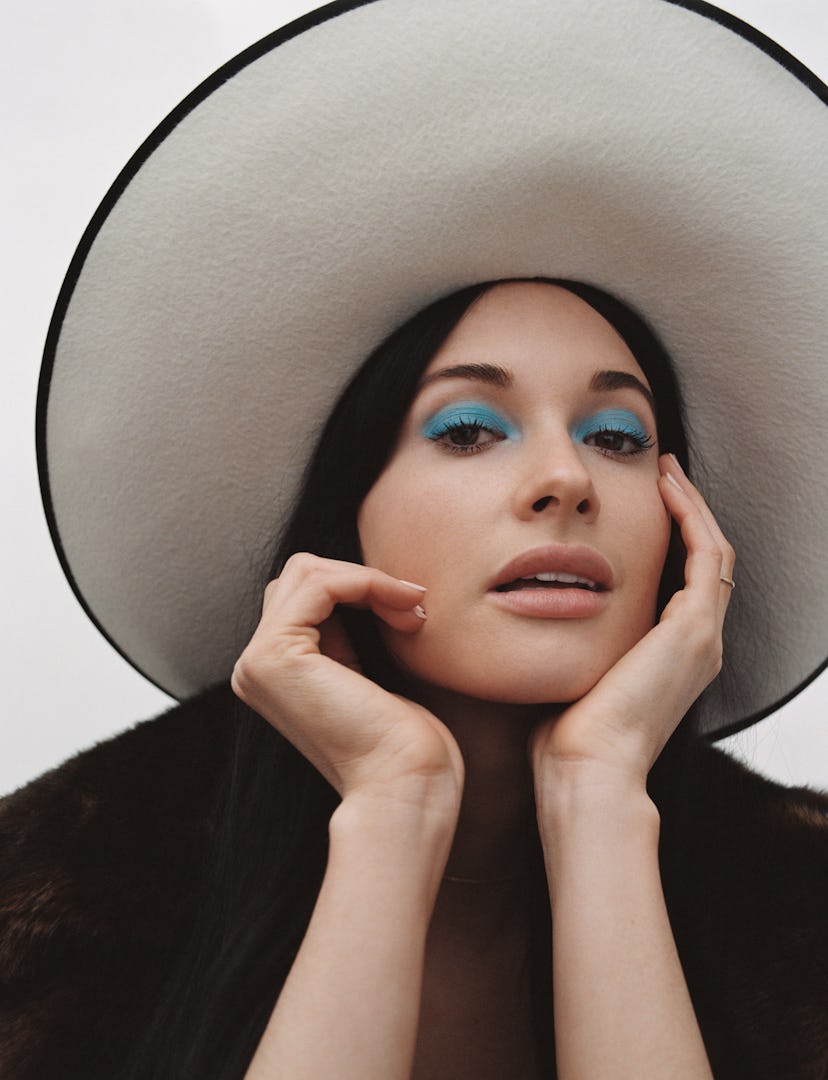Kacey Musgraves Is Defining A New Wave of Country Music
The singer and gun control advocate has not only become one of the most important crossover stars of our times—she is also leading the charge in transforming the country music landscape.

The country singer Kacey Musgraves relishes defying her audiences’ expectations. During a performance at the Lollapalooza music festival in Chicago last August, she played the opening chords of “Rainbow,” a somber piano ballad from her critically lauded album Golden Hour, which has been called “a message of hope for anyone in the midst of dark times.” But then she suddenly paused. She needed to speak her mind.
“I don’t know what the answer is, but obviously something has to be fucking done,” she said. She was referring to the horrifying gun massacres that had struck the United States earlier that month: the mass shootings in El Paso, Texas, and Dayton, Ohio. “Maybe somebody will hear us if we all yell together and say, ‘Somebody fucking do something!’ ”
Etro shirt; Gucci hat. Beauty note: [Revlon ColorStay Crème Eye Shadow](https://www.revlon.com/eyes/eye-shadow/colorstay-creme-eye-shadow?shade=peacock&&gclid=EAIaIQobChMIvbGIubDn5AIVw5yzCh1olwEoEAAYASAAEgJ7dvD_BwE&gclsrc=aw.ds) in Peacock.
Saint Laurent by Anthony Vaccarello dress.
“Somebody fucking do something!” the crowd of 50,000 roared back.
Musgraves’s rallying cry quickly caught on with the national media. Fox & Friends clutched its pearls, fretting that she had used expletives. (“What happened to wholesome country singers?” the show’s cohost Ainsley Earhardt asked.) The Washington Post singled out Musgraves as “the rare country singer to address gun control.” On Twitter, Musgraves made a direct appeal to the White House: “True leaders don’t stand back and watch the world burn,” she wrote. After a fan replied that she should “stick to singing,” Musgraves pointed out that she is a Texas native who grew up with hunting and gun culture. “The system is majorly flawed,” she shot back.
Alberta Ferretti coat; Gucci hat; vintage belt from Pilgrim New York, New York.
It’s disruptive moments like these that have made Musgraves one of the most influential—and unorthodox—voices in country music, whether or not she wants to admit it. “I don’t feel like I am one to speak on country’s behalf, you know?” she says modestly, with her characteristic mix of cerebral iciness and laid-back cool. Ruffling feathers has been her modus operandi from the start. Although Musgraves is just 31 years old, the Country Music Hall of Fame and Museum is currently housing a retrospective of her life in sequins and fringe. The exhibition offers a snapshot of Musgraves’s rise from a rebellious young girl raised “in the sticks” of Golden, Texas, to a six-time Grammy-winning megastar. “It’s been a long road,” she says, referring to her old guitars, and pieces like a custom red-white-and-blue leather Western dress from her salad days as a young cowgirl, as well as recent red-carpet showstoppers from designers like Moschino and Versace that fuse yee-haw camp with hard-edged Studio 54 glamour. “I grew up with no ounce of Versace in small-town Texas, okay?”
The most revealing item at the museum is a high school detention letter she received for being—you guessed it—disruptive. “I wouldn’t say I was the best student by any means,” she says. “I found myself bored by conventional learning methods, and I just felt like I wanted something else. I kind of had a little bit of sass going on.”
Gucci vest and shorts.
Gucci coat, bra, panty, hat, and tights.
That fighting spirit still guides her. When she first began making a name for herself on the Nashville scene, she challenged the status quo by making honky-tonk tunes that touched on taboo topics (for country music, at least) like smoking weed and gay rights. “Merry Go ’Round,” the first single from her 2013 major label debut, Same Trailer Different Park, is an ode to “mamas hooked on Mary Kay” and “brothers hooked on Mary Jane.” The story goes that record-label bigwigs felt that a song about drug addiction was too risky for a first single; it ended up scoring a Grammy for Best Country Song.
Alberta Ferretti coat; Gucci hat; vintage belt from Pilgrim New York, New York; Wolford socks; vintage shoes from Early Halloween, New York.
Musgraves sees her renegade instincts as part of a long legacy of plain-talkin’ crooners like Alison Krauss and Lee Ann Womack, who speak candidly about the human condition. “I love the fact that the genre that I come from is traditionally built on stories about real people and real hardships, so I don’t understand why everyone wouldn’t be included in it because really it’s just a human thing,” she says. On Golden Hour, she ditches overt political statements for psychedelic-tinged songs about falling in love with her now husband, the handsome alternative country singer Ruston Kelly. “Going into the newest album, I was like, ‘Man, I’m happy now. I’m getting married. I’m like, What the fuck am I going to do? Am I still able to write?’ It was nice to know I could still create,” she says.
Songs like “Oh, What a World” and “Slow Burn” sparkle with existential awe about humanity’s place in the universe—an idea that she says came to her after she took a dose of LSD. “It opens your mind in a lot of ways,” she says. “It doesn’t have to be scary. People in the professional worlds are using it, and it’s starting to become an option for therapy. Isn’t that crazy?”
Miu Miu top; Kelsey Randall hat.
The crossover success of Golden Hour has meant Musgraves is back on the road for the second leg of her Oh, What a World Tour, a victory lap of sorts that wraps up at El Plaza Condesa, in Mexico City, in March. This is her first headlining arena tour, an achievement that she says is as mind-expanding as any drug. “Performing is this big energy exchange between someone onstage and the audience,” she says. “If I step back and look at it, it’s a really trippy thing to think about.”